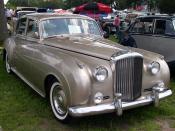The virtues and shortcomings of Mrs. Bentley In the town of Horizon, a wife of a minister writes a diary about her troublesome marriage and the actions she takes to improve it. She describes chronologically the events with rich detailed observations, which create more than often a very intense atmosphere. Her steps to overcome the problems of her marriage result sometimes in virtues but more frequently in shortcomings. Though her intentions always mean well; they become most of the time her drawbacks.
She says that Philip's negative attitude towards her and everything else around him is not caused by his failure. It's the path that was laid by the Almighty himself. "He believed he could paint - with the passion and extravagance that are natural to a boy sometimes, believed that he was meant to paint."ÃÂ1 She believes that "the important thing [is] to fulfill himself, let the end justify the means."ÃÂ2
She is willing to ignore all the facts just to justify Philip's selfish acts. The behavior does not make the problems disappear, nor change Philip's attitude, nor improve their marriage; it just makes the things look better for her. It does not make them better.
Philip was indeed selfish for right from the beginning of his relationship with Mrs. Bentley, and she knew he was different. She noticed that he did not depend on women as much as other men did. He is "the kind to stand back and appraise [women], make his decision reflectively."ÃÂ3 When he did not succeed in becoming an artist, he kept his head high, retained himself. He did not allow Mrs. Bentley to get involved in his struggle. He kept on struggling on his own in his untouchable, unsharable, selfish way.
Her second attempt to justify Philip's selfishness ends up as another of her many flaws. She says that Philip is a born natural artist. She accuses herself of being a woman and marrying him because she knew he was an artist and that he needed to be free. She writes that: "as a woman I would make claims upon him, and that as an artist he needed above all to be free."ÃÂ4 When she married Philip, she thought that he would change and would love her; but he did not, and now she is left in the kitchen alone while he is locked in his study-room, drawing.
Despite all the inhumanity and carelessness that Philip shows, he becomes very attached to one person, Steve. But his selfishness gets to him when Mrs. Bentley tries to impress Steve with her music talents. She wants to show Philip that she is just as talented in music as he is talented in drawing. "It hurt Philip. At that time I approved, ["æ] but I wish now I had spared him."ÃÂ5 She realizes, though it is too late, that by taking away Steve from him, she does not do any good to their relationship. She makes another fault out of what she hoped to be goodness.
Mrs. Bentley makes similar mistake at the Ladies Aid. Mrs. Finley tries to insult Mrs. Bentley by saying: "Why don't you get a radio, Mrs. Bentley? We hear such splendid sermons I often think if only Mr. Bentley could listen in they would be a great help to him I'm sure."6 Mrs. Bentley replied to the insult: "If he did listen it, ["æ] he might be tempted to borrow from them, and it doesn't do, you know, to go over the heads of your congregation."ÃÂ7 She is pleased at having a good reply to an insult. She is so pleased with herself that that afternoon she tells Paul. But to her surprise, he says gravely: "I'm sorry you did it. You must never let yourself become a fly-flap."ÃÂ8 In fact, it is a counsel of the philosopher Frederick Nietzsche. This counsel means that if you succeed in dealing with one affront, other will come right after to offend you even more. Once more, what seems rectitude, is really infirmity.
For a long time, Mrs. Bentley undertakes to possess Philip, to get him involved in her life, but he just wants to be left alone and she yields. The time when Philip was writing his book, he kept himself distant from everything, especially his wife. She declares that she understands what is the matter with her husband, but does she? It was the temper of the artist inside of him, she says. After his book fails, after his world collapses and becomes empty, he still does not want to engage himself in a relationship with his wife. "His own world was shattered and empty, but at that it was better than a woman's."ÃÂ9 Now, she is blaming herself for being a woman and intervening in an artist's life. She has sacrificed her talents to be with him, so should he.
Like Philip, Mrs. Bentley has her ambitions too. She loves the piano. Before they met, the only thing that really mattered for her was the piano. She was working hard as a teacher to save money for music school in the East. She always wanted to go to Europe and become a famous pianist like her neighbor boy, Percy Glenn, did. Now, with Philip, her passion is taking second place, right after Philip's. Now, she does not even think about going outside Horizon. She thinks that Philip's passion for drawing is more important than her passion for piano, and it is just not true. Because she thinks that way, she fails to fulfill her wish and creates her shortcoming.
Sometimes, it gets to her that maybe, just maybe, she has lost Philip; but then, she does not dare to admit it to herself. For all the effort she has put into it, she must continue trying to possess him, trying to show him that she matters to him. If not, she would have nothing else left in her miserable life. She is not like Philip. She does not lock herself from the world around her nor does she create a world of her own; she is ready to share her world with others and get involved in other's world. From the day she lets him see that she is inferior, from that day on, everything she does, she does for nothing because she has failed and her failure becomes her frailty.
She remembers one neighbor boy called Percy Glenn with whom she used to play when they were little. Years after, she writes him a letter saying she is married to a preacher, living in a little prairie town and playing for the Ladies Aid. His answer was pitiful. He said that he is very successful and he plays in front of a lot of people. At that point, she realizes how happy she could have been if she had not married Philip and carried out her dream of becoming a famous pianist. She never writes back to him again. Though she knows that she is not happy with Philip, she would not go back to square one; meaning divorce Philip and start over with her dream. It's too late. She is too old now to do that.
One reason why their marriage is not a success is because she and Philip are too different and have too much uncommon between them. Philip is wild and ready to face nature, his dream. Even though he is a preacher now, he keeps on drawing in his free time. When Philip names the dog Steve brought home El Greco, he tries to project something of himself. The sense of being stretched on the rack of a role that leads to self-contempt, and El Greco ends in a way that casts an oblique light on Philip's predicament and his hopes. She is afraid of the wilderness and the wind; she does not want to leave civilization behind. Like one evening, after Paul lest after visiting her, she decided to go for a walk to see the grain elevators. When El Greco started to howl at the foul moon, she realized that she was pretty far away for the lights of the town and got scared. "There was something wild and ghostly about it, like a skulking, primeval terror, and I was glad to reach the lights again, and safety of the house."ÃÂ10 She will never be happy with Philip because their marriage is a pretend, it is not real love nor it will be in future.
At one point, Mrs. Bentley becomes afraid that she is not that pretty anymore. Someone is more attractive to Philip than she is, someone like Judith West. She is scared that Judith may easily take Philip away. Judith tries to hide her guiltiness by cleaning Mrs. Bentley's house, baking her dinner, rubbing her shoulders "with liniment till the pain was nearly gone, but she wouldn't look at [her]. All her activity was just to hide herself. She knows now, and I'm afraid of her."ÃÂ11 Mrs. Bentley ought to be fearful because Judith's last name, West, stands for western wilderness and freedom, just what Philip seeks for all his life.
One of the most disturbing moments of this novel is when the adultery is committed. Mrs. Bentley is sick and in bed, while he is out there with Judith. When she wakes up and goes to the shed, she does not open the door to reveal the shame of her husband. "I wanted to, but there seemed something forbidding it."ÃÂ12 That something is her fear of loosing her husband and everything she wants to have with him. Instead of confronting him, she lets him finish his business and allows him afterwards to go to sleep with her in the same bed. That is her biggest delinquency because not only does she forgive him, she does not let him know that she is aware of his adultery. In addition to that, she is acting like she is the guilty one. She is neglecting her rights as a wife to have a loyal husband.
Towards the end of the novel, she breaks down and begins to incriminate herself for being a woman with no dignity or pride, as though her situation is all due to her deficiencies. "I'm a fungus or parasite whose life depends on his. He throws me off and I dry and wither. My pride's gone."ÃÂ13 She has put herself trough so much misery and agony that she is no longer able to handle it all. She looses all her self-appreciation and self-confidence.
From the first time Mrs. Bentley meets Paul, she compares him to Philip. She sees that Paul has more interests in common with her than Philip; but she is still not convinced that Paul is better than Philip. "Paul could have a hundred virtues and Philip one, but Paul would still just come to Philip's shoulders."ÃÂ14 She says that because she is not acquiescent to acknowledge that she might like someone else more than Philip, someone like Paul. Therefore, she is not persuaded to divorce Philip and remarry Paul; even though Philip himself implies that that what she wants to. She will not commit any adultery with Paul just to avenge herself against Philip either. She considers herself strong enough to prevail against this temptation. She does not see her true path to happiness, therefore she fails once more.
Later on, Mrs. Bentley takes a walk by the river with Paul. At some point, their hands become strangely close to each other; though, they have the opportunity to touch each other and show all the love they have for each other, they turn away and she goes back home to prepare Philip's supper. This shows that she is committed to the vows she took when she got married to Philip and she will not break them even though she has all the reasons in the world to do so.
After all the events, Mrs. Bentley finally settles down and concludes her diary. Her end result shows no justice towards her or the future of their marriage. The son that Philip always wanted finally arrives. He is not one of Mrs. Bentley's, but the product of Philip's and the late Judith West's adultery. To stay with Philip, Mrs. Bentley does what seems to be inhuman and incomprehensive: she adopts this baby, most disturbing. In addition, she lets Philip manage the bookstore even though it is clear that she is more skillful to run it. And what about the future of their marriage? It will be one of the most stressful and strangest. With the currant situation, Mrs. Bentley will not live to see old age.
Endnotes 1. Sinclair Ross, As For Me and My House (Toronto: McClelland & Stewart Ltd., 1989), p.22.
2. Ibid., p. 22.
3. Ibid., pp.22 -23.
4. Ibid., p.44.
5. Ibid., p.63.
6. Ibid., p.174.
7. Ibid., p.174.
8. Ibid., p.174.
9. Ibid., p.85.
10. Ibid., p.160 11. Robert Kroetsch, Afterword as found in Sinclair Ross, As For Me and My House (Toronto: McClelland & Stewart Ltd., 1989), p.219.
12. Ross, p.162.
13. Ibid., p.199.
14. Ibid., p.178.





